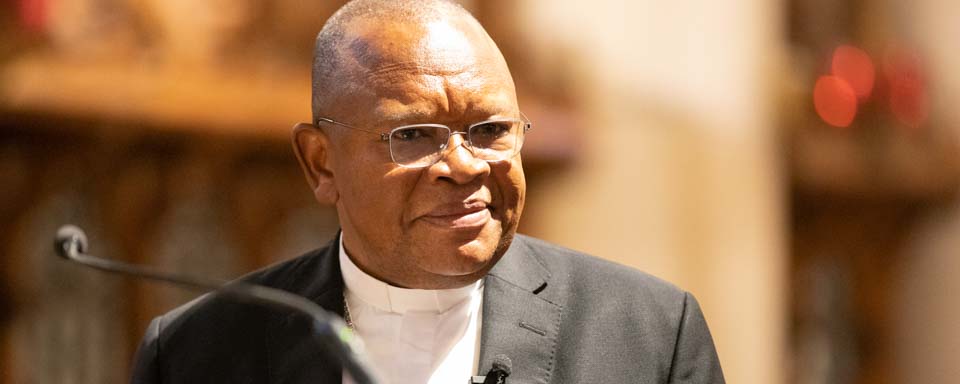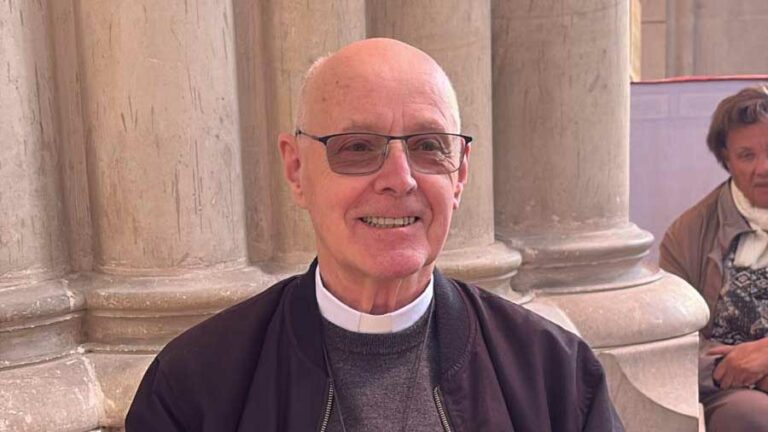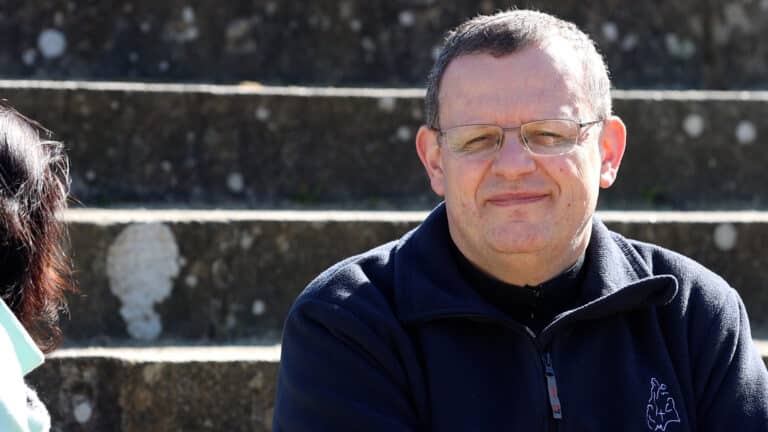“Hope does not disappoint”(Rm 5:5). Find out more about the message Cardinal Fridolin Ambongo, Archbishop of Kinshasa, addressed to the pilgrims whilst guest of honour at the shrine of Our Lady of Montligeon on Sunday 12th November 2023.
Dear brothers and sisters in Christ,
Brotherly greetings in Christ Jesus! Overfilled with joy, I wish you peace and health. I would like to first of all thank all that have made it possible for me to come and to be blessed to address you all today here. I also personally thank each of you for coming to my lecture. I chose to present you with a few reflections on a well-known parabole from Scripture: “does not disappoint.” (Rm 5:5). It’s a subject that’s very much in line with, or rather at the heart of, the spirituality that nourishes the pilgrims’ faith here at the shrine of Montligeon.
The Catholic Church Catechism teaches that “Hope is the theological virtue by which we desire the kingdom of heaven and eternal life as our happiness, placing our trust in Christ’s promises and relying not on our own strength, but on the help of the grace of the Holy Spirit. (CCC N. 1817). Desiring happiness, trusting in God, together with the help of grace, weave the web of hope. Indeed, God placed in the hearts of men and women the desire to seek and find him. Finding God and living in full communion with him is therefore the utmost happiness. And we all seek it. We spend our time seeking it, and invest all our energies in it. Even if we do not put our desire for happiness into words, the fact remains that it is truly engraved in our hearts. This happiness takes many forms. It is the expression of diverse and powerful expectations: to enjoy good health, to have a close-knit family, a good job, children who develop well and succeed in life and in their studies, the desire for profound peace, to aspire to a blessed old age, etc.
In the face of these legitimate expectations for a fulfilled and peaceful life, a happy life, arise unpleasant surprises that life sometimes throws at us. We know that things do not always going the way we would like them to. We are, so to speak, forced to reckon with situations that upset us and sometimes have a negative impact on our life and destiny. These aggravations can be summed up in one expression: life’s trauma!
Life can harm us in numerous manners; not wanting to presently do an inventory of trials and suffering that can befall during one’s life, I nevertheless think of:
- people struggling to overcome alcohol or drug addiction;
- people who cannot get out of mourning the loss of a loved one;
- people living in seclusion,
- people forced into unemployment,;
- families living in precarious conditions;
- people in war-torn countries;
- people in fear of the future, and so forth.
Nowadays more than in the past, tragedies worldwide (war between Ukraine and Russia, Israël and Palestine, armed conflicts in the Sahel Region and in the Democratic Republic of Congo, devastating cyclones and typhoons, the adverse effects of global warming, etc.) demonstrate how one’s aspiration to happiness turns into dark disappointment. Indeed, most often, life disappoints us; I dare say it can quite disappoints!
Nevertheless we should not give up. Such situations are existentially experienced as failures. We get affected at a morale but also a psychologic level, and these situations tend to diminish our capacity for resilience. Wounded by life in such a way, many of our contemporaries fall into a state of despair that can lead to irreparable damage. From their standpoint, there is no way out, the horizon appears bleak, even barred, presenting no happy prospect. That’s why they’ve given up the fight, because, as the saying goes, “all bets are off”! Albeit we need to inscribe Christian Hope in the very depth of what induces us to doubt, in the depths of that part which reveals itself as the dark side of human existence. And, what is more, to reveal its power and hidden dimension. Indeed, the potency of Christian hope lies in one’s awareness of one’s historical responsibility towards building a world of solidarity and brotherhood.
Significance of Christian hope
Saint Paul’s statement “Hope does not disappoint” (Rm 5:5) « l’espérance ne déçoit pas » (Rm 5, 5) calls to appreciate the difference between hope and hopefulness. Hopefulness can be disappointed in the measure that it tends towards acquiring assets or goods in a not-so-distant future. On the contrary, “Hope does not disappoint” because it’s a gift from God. And this gift provides us with the assurance of obtaining the goods that God promises. Furthermore it is the certainty of entering eternal bliss once our earthly pilgrimage is over. Whilst hope stops with the earthly horizon of desired goods, hope transcends time, redirecting human hopes towards true Happiness. In other words, as Pope Francis points out, hope “speaks to us of something deeply rooted in every human heart, independently of our circumstances and historical conditioning. Hope speaks to us of a thirst, an aspiration, a longing for a life of fulfillment, a desire to achieve great things, things that fill our heart and lift our spirit to lofty realities like truth, goodness and beauty, justice and love… ” (Fratelli tutti, 55).
O God, protector of those who hope in you, without whom nothing has firm foundation, nothing is holy, bestow in abundance your mercy upon us and grant that, with you as our ruler and guide, we may use the good things that pass in such a way as to hold fast even now to those that ever endure (…)” (collect prayer of the seventeenth Sunday of Ordinary Time)
Similarly, in another passage of the Scripture, St. Paul affirms: “If for this life only we have hoped in Christ, we are the most pitiable people of all.” (I Cor. 15:19). Consequently, we can say that Christian hope nurture human hopes; on the other hand, left to their own devices, human hopes loose consistency.
Christ’s Resurrection: fount of hope
The light of the Risen Christ nourishes Christian hope and “And if Christ has not been raised, then empty [too] is our preaching; empty, too, your faith.” »” (I Co15, 14). Hoping is truly living as raised with Christ. Therefore, bringing Christian hope back to the very core of the mystery of the Lord’s resurrection is akin a historical commitment that goes far beyond the simple pursuit of earthly goods: “If then you were raised with Christ, seek what is above (…)Think of what is above, not of what is on earth. For you have died, and your life is hidden with Christ in God. ” (Col 3, 1:4). Make no mistake: Christian hope is not discarnate, or ethereal; rather, it is the very hope that inspires, sustains and enlightens our daily thoughts and deeds. Christ’s resurrection is its source. Thus, such hope can change our fears, sadness, failures or despair, into joy and hope. Empowered by such a faith in the Lord’s resurrection, we grasp that we have a double responsibility: one towards the living, with whom we work together in building a fraternal world; and the other, the responsibility towards those who are gone.
Seeing that they fell into the sleep of death, having shared the joys and sorrows of this life, our deceased remind us of the desire that inhabited them whilst on earth: the desire for eternal communion with God. True, they may not have been in communion of faith with us. Yet we too are aware that divine grace works in hearts in ways that human intelligence cannot apprehend. To illustrate what I’ve just said: see the seeds of goodness, truth and beauty sown in every person’s heart. These seeds are bestowed by grace and rekindled by the Holy Spirit with sovereign freedom.
When we offer prayers and suffrages on behalf of the deceased, we honour the admirable work God has accomplished in their lives. At the same time, we rely on God’s merciful goodness to work His might and snatch them from the throes of eternal death. It is this powerful hope that keeps us so faithful in prayer. It is deeply-rooted in hope that the Church “prays and ‘who wills everyone to be saved (1 Tm 2: 4). She longs to be united with Christ, her Bridegroom, in the glory of heaven (CEC # 1821). Indeed, such a prayer carries the hope of the entire body of Christ and takes root in the vast communion of Saints. It is through prayer that we truly share in the eschatological dimension of hope, fas we thus unite with the Church in Heaven. This communion is ever more vivid, even when the course of history contradicts it.
Through prayer, hope does not get disappointed when faced with the failures and tragedies of history, but strengthens with resilience and innovation. In particular, by praying for the deceased and for the souls in purgatory, the Church follows in Abraham’s footsteps, he who kept “hoping against hope” (Rm 4: 18). She also places herself at the school of the Blessed Virgin Mary, to whom the Angel Gabriel confided that “nothing will be impossible for God” (Luke, 1:37). In the face of life’s difficulties and tragedies, the first attitude of hope calls to turn to God in trust and prayer.
Concluding remarks
I would like to conclude by inviting you to be courageous, to be very courageous, in the face of the difficult situations we may encounter. I would even go so far as to describe this courage as “inner strength”, which comes from the light of Christ. Keeping our eyes on Christ is a grace we must request from God. At all times, and in all circumstances. For, in the midst of life’s worst failures and traumas, only Christ can give deep joy and peace. Holding hands, with tender affection, and keeping close to one another is a concrete way of living the synodal process in which we are now engaged: weeping together and rejoicing together!
Fridolin Cardinal AMBONGO BESUNGU, OFM Cap
Metropolitan Archbishop of Kinshasa




